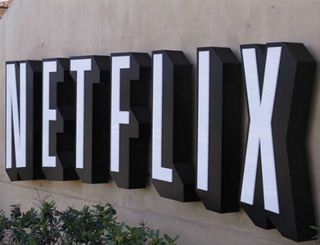Netflix Adds Weapon To ISP Blame Game

Expanding on its monthly ISP Speed Index, Netflix is trying out a new way to point the finger at broadband service providers by name when users encounter buffered video streams.
The new weapon came to light Tuesday when Yuri Victor of Vox Media tweeted a screenshot of a Netflix browser message that read: “The Verizon network is crowded right now. Adjusting video for smoother playback…”
As Victor’s discovery made the rounds on Twitter, Netflix chief communications officer Jonathan Friedland noted in a tweet that the streaming video company is “always testing new ways to keep members informed.”
Friedland told Re/code that the new tactic is ISP agnostic, and not directed only at Verizon, calling it a “test that advises members when their network is congested…We’ll see whether they think it is valuable or not.”
Regardless, Verizon wasn’t amused by Netflix’s new approach. “This is a PR stunt. We’re investigating this claim but it seems misleading and could confuse people,” a Verizon spokesman said in an emailed statement.
Netflix’s latest move comes as the company urges the FCC to pursue “stronger” network neutrality rules and to include paid peering agreements into the scope of the rule-makings discussion.
It also comes into view in the wake of paid interconnection between Netflix and two major ISPs – Comcast and Verizon. Netflix has said it reluctantly agreed to those deals in order to ensure the quality of its streaming service while complaining that they are tantamount to an “arbitrary tax” on Netflix and other OTT services. Netflix and AT&T are also in interconnection talks.
Multichannel Newsletter
The smarter way to stay on top of the multichannel video marketplace. Sign up below.
Through its use of new ISP-labeled buffering messages, “Netflix is looking to harness the power of its subscriber base to drive its message home to regulators and politicians,” BTIG Research analyst Rich Greenfield wrote in a blog post (free registration required). “Essentially Netflix is saying call Verizon, not us. We suspect Netflix hopes this will generate enough call volume to ISPs, politicians and the FCC that it forces ISPs to rethink their paid interconnection policies, not to mention the Comcast acquisition of Time Warner Cable.”
Netflix’s preference is for ISPs to join Open Connect, a private content delivery network that relies on free, Netflix-supplied edge caching appliances. While several broadband service providers, including Google Fiber, Cablevision Systems, RCN, Cox Communications and Suddenlink Communications, have joined Open Connect, other ISPs have said privately that allowing Netflix on the network will force it to do the same for other OTT providers, and that the edge appliances, even when provided for free, aren't entirely free because they still cost money to power and cool.
Update: David Young, Verizon’s executive director, federal government relations, followed Wednesday with a blog post with the headline “Shifting Blame,” claiming it’s unlikely that the congestion issue is Verizon’s, but in Netflix’s transit path to the Verizon network.
“It would be more accurate for Netflix's message screen to say: ‘The path that we have chosen to reach Verizon’s network is crowded right now,’” Young wrote. It is sad that Netflix is willing to deliberately mislead its customers so they can be used as pawns in business negotiations and regulatory proceedings.”
While ISPs such as Verizon and Comcast have argued that interconnection deals are strictly business agreements that have long governed how the Internet works when there's an imbalance in traffic levels and don't belong in the net neutrality debate, Netflix, which has developed its own content delivery network, and CDN providers such as Cogent charge that ISPs have let their peering points degrade and have hesitated to beef them up without payment.
Dave Schaeffer, CEO of Cogent Communications, has offered to pay for ISP peering upgrades. Cogent, which stands to lose some business amid more interconnection deals between OTT providers that run their own CDNs and ISPs, as also wants the FCC to reclassify broadband under Title II.
